Bosch NGT, NGP User Manual
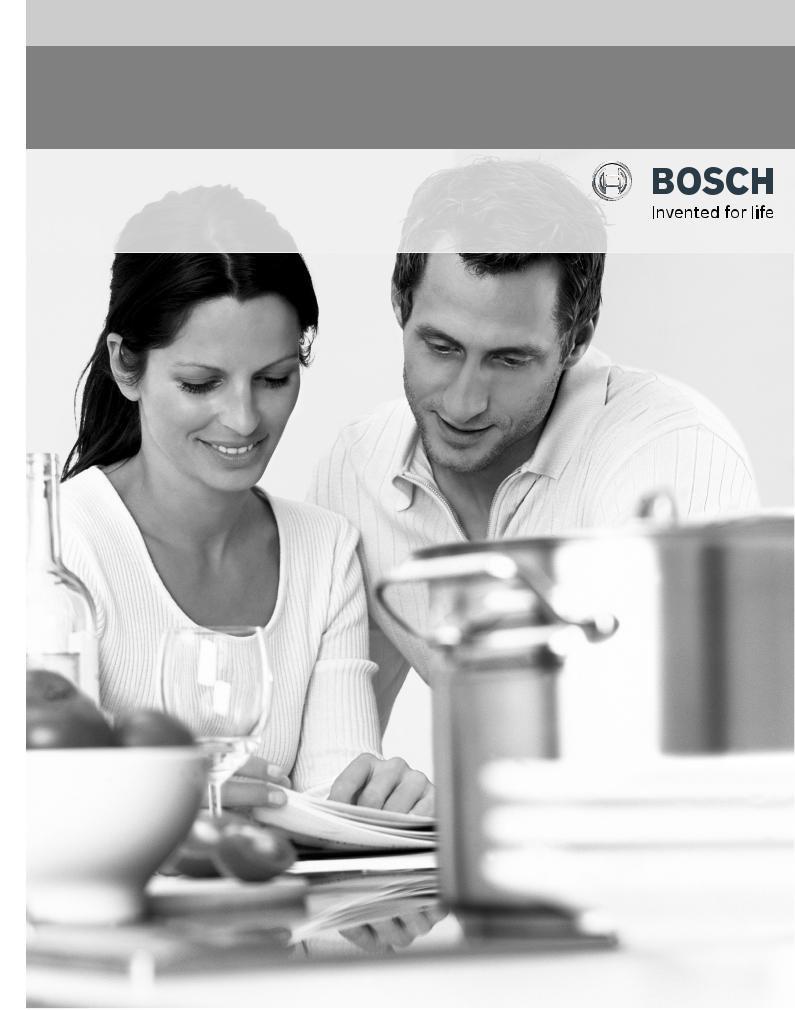
Bosch Use and Care Manual:
NGT/NGP

Questions?
1-800-944-2904
www.boschappliances.com
5551 McFadden Ave.
Huntington Beach, CA 92649
We look forward to hearing from you!
Table of Contents
Important Safety Instructions . . . . . . . . . . . . . . . . . . . . . . . . . . . . . . . . . . . . . . . . . . . . . .1
About the Cooktop . . . . . . . . . . . . . . . . . . . . . . . . . . . . . . . . . . . . . . . . . . . 3
Parts and Accessories . . . . . . . . . . . . . . . . . . . . . . . . . . . . . . . . . . . . . . . . . . . . . . . . . . .3
Sealed Burners . . . . . . . . . . . . . . . . . . . . . . . . . . . . . . . . . . . . . . . . . . . . . . . . . . . . . . . . . . . . . . . .4
Burner Caps . . . . . . . . . . . . . . . . . . . . . . . . . . . . . . . . . . . . . . . . . . . . . . . . . . . . . . . . . . . . . . . . . .4
Burner Grates . . . . . . . . . . . . . . . . . . . . . . . . . . . . . . . . . . . . . . . . . . . . . . . . . . . . . . . . . . . . . . . . .4
Burner Control Knobs . . . . . . . . . . . . . . . . . . . . . . . . . . . . . . . . . . . . . . . . . . . . . . . . . . . . . . . . . . .5
Using the Cooktop . . . . . . . . . . . . . . . . . . . . . . . . . . . . . . . . . . . . . . . . . . . . 5
Before Using the Cooktop for the First Time . . . . . . . . . . . . . . . . . . . . . . . . . . . . . . . . . .5 Operation . . . . . . . . . . . . . . . . . . . . . . . . . . . . . . . . . . . . . . . . . . . . . . . . . . . . . . . . . . . . .6
Normal Operation (Electronic Ignition/Reignition) . . . . . . . . . . . . . . . . . . . . . . . . . . . . . . . . . . . . . |
6 |
In the Event of a Power Failure . . . . . . . . . . . . . . . . . . . . . . . . . . . . . . . . . . . . . . . . . . . . . . . . . . . |
6 |
Typical Flame Characteristics . . . . . . . . . . . . . . . . . . . . . . . . . . . . . . . . . . . . . . . . . . . . . . . . . . . . |
6 |
Getting the Most Out Of Your Cooktop . . . . . . . . . . . . . . . . . . . . . . . . . . . . 7
Cooking Techniques (For Best Results) . . . . . . . . . . . . . . . . . . . . . . . . . . . . . . . . . . . . .7
Proper Cookware . . . . . . . . . . . . . . . . . . . . . . . . . . . . . . . . . . . . . . . . . . . . . . . . . . . . . . .7
Cookware Characteristics . . . . . . . . . . . . . . . . . . . . . . . . . . . . . . . . . . . . . . . . . . . . . . . . . . . . . . . .7
Proper Cookware Practices. . . . . . . . . . . . . . . . . . . . . . . . . . . . . . . . . . . . . . . . . . . . . . . . . . . . . . 7
Cooking Chart . . . . . . . . . . . . . . . . . . . . . . . . . . . . . . . . . . . . . . . . . . . . . . . . . . . . . . . . .8
Care and Cleaning . . . . . . . . . . . . . . . . . . . . . . . . . . . . . . . . . . . . . . . . . . . 9
Daily Cleaning Practices . . . . . . . . . . . . . . . . . . . . . . . . . . . . . . . . . . . . . . . . . . . . . . . . .9
Cleaning Guidelines . . . . . . . . . . . . . . . . . . . . . . . . . . . . . . . . . . . . . . . . . . . . . . . . . . . .10
Service . . . . . . . . . . . . . . . . . . . . . . . . . . . . . . . . . . . . . . . . . . . . . . . . . . . 11
Before Calling for Service . . . . . . . . . . . . . . . . . . . . . . . . . . . . . . . . . . . . . . . . . . . . . . .11
Data Plate . . . . . . . . . . . . . . . . . . . . . . . . . . . . . . . . . . . . . . . . . . . . . . . . . . . . . . . . . . .11
For Authorized Service or Parts . . . . . . . . . . . . . . . . . . . . . . . . . . . . . . . . . . . . . . . . . . .11 Warranty . . . . . . . . . . . . . . . . . . . . . . . . . . . . . . . . . . . . . . . . . . . . . . . . . . . . . . . . . . . .11
What Is Covered - Full One Year Warranty . . . . . . . . . . . . . . . . . . . . . . . . . . . . . . . . . . . . . . . . .11 What Is Not Covered . . . . . . . . . . . . . . . . . . . . . . . . . . . . . . . . . . . . . . . . . . . . . . . . . . . . . . . . . .11 Warranty Application . . . . . . . . . . . . . . . . . . . . . . . . . . . . . . . . . . . . . . . . . . . . . . . . . . . . . . . . . .12
Model Information . . . . . . . . . . . . . . . . . . . . . . . . . . . . . . . . . . . . . . . . . . . . . . . . . . . . .12
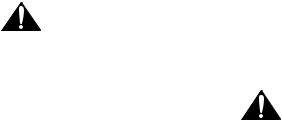
IMPORTANT SAFETY INSTRUCTIONS
READ AND SAVE THESE INSTRUCTIONS
Important Safety
Instructions
WARNING: Read all instructions before using this appliance. To reduce the risk of fire, electric shock, or injury to persons, take these precautions:
General Safety
•This appliance is intended for normal family household use only. See the Warranty. If you have any questions, contact the manufacturer.
•Always have a working smoke detector near the kitchen.
•Never use the cooktop to warm or heat a room.
•Children should not be left alone or unattended in an area where appliances are in use. They should never be allowed to sit or stand on any part of the appliance.
•When children become old enough to use the cooktop, they must be instructed in safe practices.
•Do not store items of interest to children above or at the back of the cooktop .
•Do not store flammable materials on or near the cooktop.
•In the event that personal clothing catches fire, drop and roll immediately to extinguish flames.
•Never let clothing, potholders, or other flammable materials come in contact with hot burners or hot burner grates.
•Do not clean the cooktop while it is still hot. Some cleaners produce noxious fumes when applied to a hot surface.
•Smother flames from food fires other than grease fires with baking soda. Never use water on cooking fires.
•Do not allow aluminum foil, plastic, paper or cloth to come in contact with a hot burner or grate. Do not allow pans to boil dry.
•Have the cooktop installed and grounded by a qualified technician.
•Do not repair or replace any part of the appliance unless specifically recommended in this manual. All other servicing should be referred to a qualified technician.
•Do not use aluminum foil to line any part of the cooktop.
•If the cooktop is near a window, be certain that curtains or any other window covering do not blow over or near the burners; they could catch on fire.
•When using the cooktop: Do not touch the burner grates or the immediate surrounding area.
•Use only dry potholders; moist or damp potholders on hot surfaces may cause burns from steam.
•Never leave the cooktop unattended when in use. Boilovers cause smoking, and greasy spillovers may ignite.
•Always position handles of utensils inward so they do not extend over adjacent work areas, burners, or the edge of the cooktop.
•Wear proper apparel. Loose fitting garments or hanging sleeves should never be worn while cooking.
•Use only certain types of glass, heatproof glass, ceramic, earthenware, or other glazed utensils that are suitable for cooktop use.
•Leave the hood ventilator on when flambéing food.
•Smother flames from a grease fire with a close-fitting lid, cookie sheet, or other metal tray, then turn off the gas burner. Be careful to prevent burns. If the flames do not go out immediately, evacuate and call the fire department.
•Do not use water, including wet dishcloths or towels on grease fires. A violent steam explosion may result.
•Never pick up a flaming pan. You may be burned.
English 1
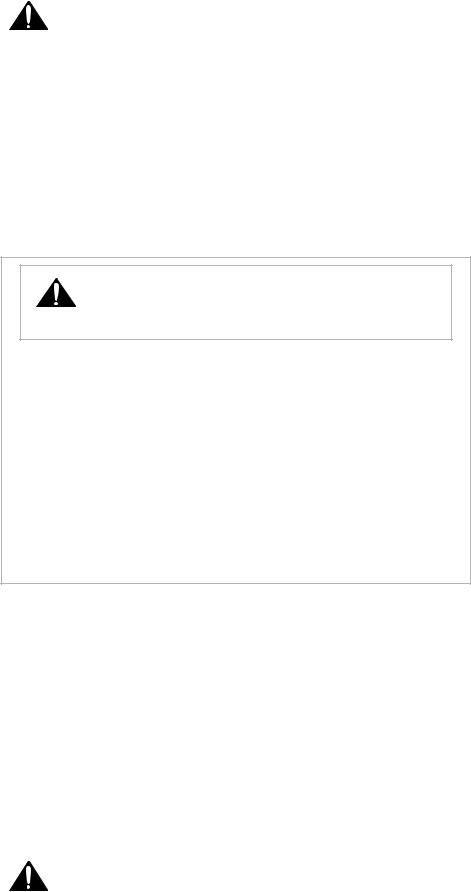
WARNING: To avoid electrical shock hazard, before servicing the cooktop, switch power off at the service panel and lock the panel to prevent the power from being switched on accidentally.
Fire Extinguishers
Use an extinguisher only if:
•You know you have a Class ABC extinguisher and you know how to operate it.
•The fire is small and contained in the area where it started.
•The fire department is being called.
•You can fight the fire with your back to an exit.
Gas Appliance Safety
WARNING: If the information in this manual is not followed exactly, a fire or explosion may result causing property damage, personal injury or death.
Do not store or use combustible materials, gasoline or other flammable vapors and liquids in the vicinity of this or any other appliance.
•WHAT TO DO IF YOU SMELL GAS:
•Do not try to light any appliance.
•Do not touch any electrical switch.
•Do not use any phone in your building.
•Immediately call your gas supplier from a neighbor’s phone. Follow the gas supplier’s instructions.
•If you cannot reach your gas supplier, call fire department.
Installation and service must be performed by a qualified installer, authorized service agency or the gas supplier.
Gas Cooking Safety
•During cooking, set the burner control so that the flame heats only the bottom of the pan and does not extend beyond the bottom of the pan.
•Take care that drafts like those from fans or forced air vents do not blow flammable material toward the flames or push the flames so that they extend beyond the edges of the pan.
•Have the cooktop installed and grounded by a qualified technician. Have the installer show you where the gas shut-off valve is located.
•For proper lighting and performance of burners, keep igniters clean and dry.
•In the event that a burner goes out and gas escapes, open a window or a door. Wait at least 5 minutes before using the cooktop.
•Do not obstruct the flow of combustion and ventilation air.
California Proposition 65
WARNING: Burning gas cooking fuel generates some by-products which are on the list of substances which are known by the State of California to cause cancer or reproductive harm. To minimize exposure to these substances, always operate this unit according to the instruc-
tions contained in this booklet and provide good ventilation.
English 2
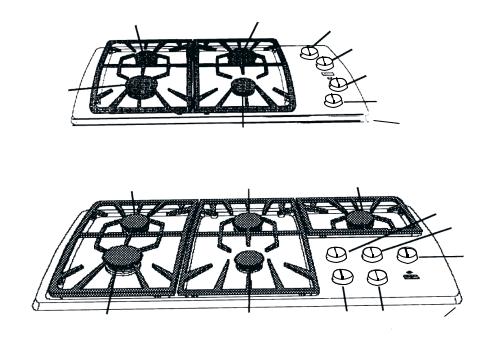
About the Cooktop
Parts and Accessories |
Figure 1 - Parts |
1 |
2 |
1 |
30" Models |
|
2
5
4
4
8
|
|
5 |
|
36" Models |
1 |
7 |
3 |
1
7
3
4 |
6 |
4 |
6 |
8 |
Table 1: Features Key
# |
Location |
BTU Rate |
|
|
|
|
|
|
1 |
Left Rear |
9,100 |
|
|
|
2 |
Right Rear - 30" |
11,000 |
|
|
|
3 |
Right Rear-36" |
9,100 |
|
|
|
4 |
Left Front |
12,500 - NGT Model |
|
|
15,000 - NGP Model |
|
|
|
5 |
Right Front-30", Simmer Burner |
6,500/950 |
|
|
|
6 |
Center Front-36", Simmer Burner |
6,500/950 |
|
|
|
7 |
Center Rear-36" |
11,000 |
|
|
|
8 |
Serial Number/Data Plate |
|
|
|
|
* Key numbers 1-7 also correspond to the control knob location for the burner.
English 3
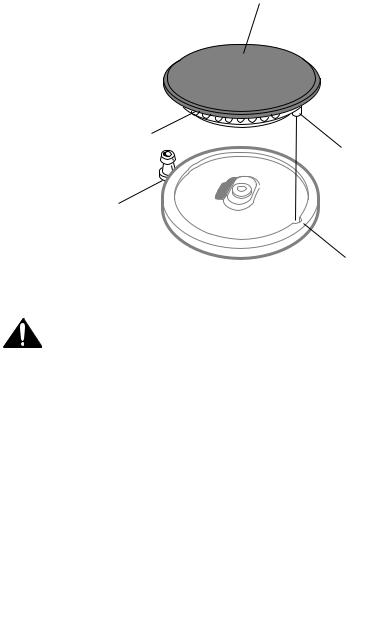
Sealed Burners |
Your new cooktop has sealed gas burners. There are no burner parts under the |
|
cooktop to clean, disassemble or adjust. Your cooktop has two different burner |
|
cap sizes, large and medium. Match the pan to the size burner. |
Burner Caps |
The burner cap is porcelainized steel. On the underside of the cap is one locator |
|
which must fit into the corresponding notch on the burner base. If the burner cap |
|
is not placed correctly, the burner may not light or the flame may not burn com- |
|
pletely or correctly. |
|
Figure 2 - Burner Cap |
Porcelain
Enamel Cap
BURNER CAP
|
Ports |
|
Locator |
|
Igniter |
|
Notch |
|
BURNER BASE |
|
WARNING: To prevent flare-ups do not use the cooktop without all |
|
burner caps and all burner grates properly positioned. |
Burner Grates |
The position of each double grate is labeled on the underside edge of the grate as |
|
shown in the figure below. |
|
Figure 3 - Burner Grates |
Single - 36” models only
Universal - |
Side |
Center |
30” models |
|
|
only |
|
|
30" (76cm) Models have two universal grates. Position the straight side in the center. They are interchangeable by rotating 180°.
36" (91cm) Models have one side grate, one center grate and one single grate. Position the grates on the cooktop as illustrated above.
English 4
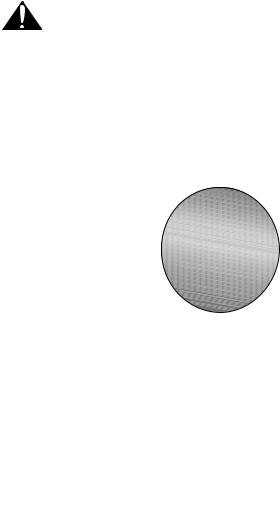
|
WARNING: To prevent flare-ups all grates must be properly posi- |
||
|
tioned on the cooktop whenever the cooktop is in use. Each of the four |
||
|
feet must be placed into the corresponding dimples in the cooktop. Do |
||
|
not use a grate if the rubber feet are missing or damaged. |
||
Burner Control Knobs |
The standard burner controls have an infinite number of heat settings with no |
||
|
fixed positions. |
||
|
Figure 4 - Burner Control Knob |
||
|
|
|
OFF |
|
|
|
|
|
HI |
|
|
|
|
|
|
LO
To operate: Select the appropriate control knob, push down and turn counterclockwise to the desired flame size. Turn OFF by turning the control knob clockwise to OFF.
A rubber grommet is located under each control knob.
To remove knob and grommet: With burner in the OFF position, gently lift knob up and off. Gently pull grommet toward center and lift out.
WARNING: To avoid electric shock, do not reach through opening into rough-in box.
To replace grommet and knob: Replace grommet by placing center groove around cooktop. The rubber grommet should be firmly attached around the cooktop opening. Place the control knob indicator line at the OFF position; press down firmly.
Using the Cooktop
Before Using the Cooktop for the First Time
•Remove all packing materials and literature from the cooktop surface.
•While cool, wipe with a clean, damp sponge and dry.
•There may be a slight odor during the first several uses; this is normal and will disappear.
•Optimum cooking results depend on the proper cookware being selected and used. (See Proper Cookware.)
•Read all safety precautions and Use and Care Manual information prior to operating.
English 5
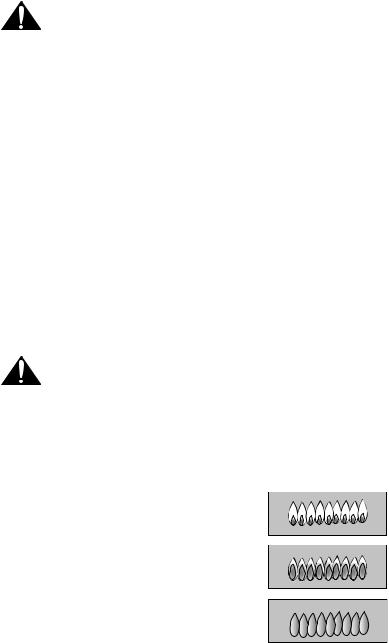
Operation
Normal Operation
(Electronic Ignition/Reignition)
The cooktop uses electronic igniters to light the burners. There is no pilot light. Each burner has its own igniter. If a burner flame blows out during use, the burner will automatically reignite.
CAUTION: All igniters spark when any single burner is turned ON or the reignition system is activated. Do not touch any of the burners when the cooktop is in use.
The ignitor should be clean and dry for proper operation.
•Avoid getting water or food on the igniter.
•If the igniter is wet or soiled, it may spark without igniting the burner, or even spark continuously when a flame is present.
NOTE: If the burner does not light within 4 seconds, turn the burner off. Check to see that the cap is positioned correctly on the burner base and the igniter is clean and dry. If a burner still fails to ignite, see Before Calling for Service.
In the Event of a Power Failure In the event of a power failure, the burners can be ignited manually.
If the cooktop is being used when a power failure occurs, turn all the burner control knobs to the OFF position. The burners can then be ignited manually by holding a match at the ports and turning the control knob to the HI position. Wait until the flame is burning all the way around the burner before adjusting the flame to the desired height.
CAUTION: The reignition feature will not work in the event of a power failure.
Typical Flame Characteristics |
The burner flame should be blue in color and stable with no yellow tips, excessive |
|
noise or fluttering. It should burn completely around the burner cap. |
Yellow Flames:
Further adjustment is required.
Yellow Tips on Outer Cones:
Normal for LP Gas.
Soft Blue Flames:
Normal for Natural Gas.
If the flame is completely or mostly yellow, verify that the regulator is set for the correct fuel. After adjustment, retest.
Some yellow streaking is normal during the initial start-up. Allow unit to operate
Foreign particles in the gas line may cause an orange flame during initial use. This should disappear with use. Check burner cap to make sure port holes are not obstructed. If the ports are clogged, see Before Calling for Service.
NOTE: An audible “pop” may be heard when the burner is turned off manually.
The “popping” may be louder with LP gas than with natural gas. This is normal.
English 6
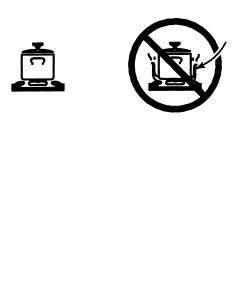
Getting the Most Out Of Your Cooktop
Cooking Techniques
(For Best Results)
•Bring food to a boil; stir well to be sure all the food is boiling, then cover and reduce the setting to the XLO zone.
•Use a lid to keep a more constant cooking temperature.
•Use a higher XLO setting if the pan is uncovered.
•Check the food occasionally to see if the control knob should be turned to a lower or higher setting.
•If the control knob is set too low to maintain simmer, bring the food back to a boil before setting a higher simmer setting.
•It is normal to stir food occasionally.
•Simmer bubbles may not be seen when the flame has cycled OFF.
•While the flame is ON, there may be bubbling.
•There should be steam and slight quivering of the liquid’s surface while simmering.
•Use proper cookware. (See section Proper Cookware below.)
•Center the pan over the burner before turning the burner on.
•Refer to the Cooking Chart below for suggested flame settings.
Proper Cookware
Cookware Characteristics |
• |
Aluminum or copper bottomed pans conduct heat evenly. |
|
|
• Steel pans, if not combined with other metals, may cook unevenly. |
||
|
• Cast-iron cookware absorbs heat slowly and cooks more evenly at low-to- |
||
|
|
medium settings. |
|
|
• Flat, heavy bottom pans provide even heat and stability. |
||
|
• DO NOT USE pans that are thin, warped, dented or ridged as they heat |
||
|
|
unevenly. |
|
Proper Cookware Practices |
|
|
|
|
Table 2: Proper Cookware Practices |
||
|
|
|
|
|
|
Practice |
|
|
|
|
|
|
|
|
|
|
a) Match Pan Diameter to Flame |
|
|
|
|
Size |
|
|
|
• The flame should be the |
|
|
|
same size as the bottom of |
|
|
|
the pan or smaller. Do not use |
|
|
|
small pans with high flame |
|
|
|
settings as the flames can lick |
|
|
|
up the sides of the pan. |
|
|
|
• Oversize pans that span two |
|
|
|
burners are placed front to |
|
|
|
rear, not side to side. |
|
|
|
|
|
|
b) |
Use Balanced Pans |
|
|
|
• Pans must sit level on the |
|
|
|
cooktop grate without rocking. |
|
|
|
• Center pan over burner. |
|
|
|
|
|
English 7
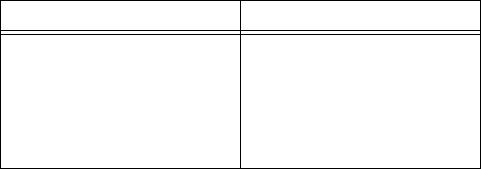
Table 2: Proper Cookware Practices
Practice
c)Use a Lid That Fits Properly
•A well-fitting lid helps shorten the cooking time.
Pans that span 2 burners, i.e. griddles, roasters and fish poachers, may be used when placed front to back. Adjust flame equally to cook evenly. Use the Bosch accessory griddle on your Bosch cooktop. To order call the number listed on the back cover.
Use a Wok with a flat bottom. If using a round bottomed wok, use the Bosch accessory support wok ring. To order call the number listed on the back cover.
For simmering stews and soups, or melting chocolate, use the Bosch simmer plate accessory. The simmer plate distributes the heat evenly and gently. The simmer plate is supplied with NGP models only, but is available separately for the NGT. Follow use and care instructions provided with the simmer plate.
Canners and pressure cookers must meet the same requirements as described above. After bringing contents to a boil, use lowest heat setting possible to maintain a boil or pressure (for pressure canners/cookers).
Cooking Chart
Table 3: Cooking Chart
Food |
Start Cooking |
Continue Cooking / |
|
Standard Burners |
|||
|
|
||
|
|
|
|
|
|
|
|
BREADS |
Med. – preheat skillet. |
Med. Lo to Med. |
|
French Toast, Pancakes, Grilled |
|
|
|
Sandwiches |
|
|
|
|
|
|
|
CEREALS |
Hl – cover, bring water to a boil, add |
Med. Lo to Med. – finish cooking |
|
Cornmeal, Grits, Oatmeal |
cereal. |
according to package directions. |
|
|
|
|
|
CHOCOLATE |
LO to melt*. |
Remove when melted. |
|
|
|
|
|
DEEP FRYING |
Hl – heat oil |
Med. Hi - Hl to maintain temperature. |
|
|
|
|
|
EGGS - Fried, Scrambled |
Med. - Med. Hi – melt butter, add egg. |
LO to Med. Lo – finish cooking. |
|
|
|
|
|
MEAT, FISH, POULTRY |
Hl – until meat starts to sizzle. |
Med. Lo to Med. – to finish cooking. |
|
Bacon, Sausage Patties |
|
|
|
|
|
|
|
Braising: Swiss Steak, Pot Roast |
Hl – melt fat, then brown on Med. Hi |
LO to Med. Lo – cover, simmer until |
|
|
to Hl, add liquid, cover. |
tender. |
|
|
|
|
|
Frying: Chicken |
Hl – melt fat, then brown on Med. |
LO – cover, finish cooking. |
|
|
|
|
|
Pan Frying: Lamb Chops, Thin |
Med. HI to Hl – preheat skillet. |
Med. to HI – brown meat. |
|
Steaks, Hamburgers, Link Sausage |
|
|
|
|
|
|
English 8
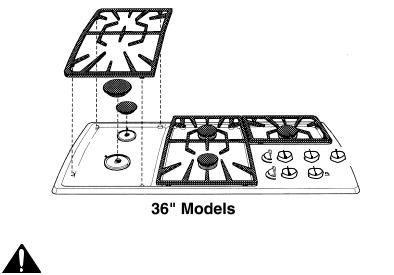
Table 3: Cooking Chart
Food |
Start Cooking |
Continue Cooking / |
|
Standard Burners |
|||
|
|
||
|
|
|
|
|
|
|
|
Simmering: Stewed Chicken, Corned |
Hl – cover, bring liquid to a boil. |
LO to Med. Lo |
|
Beef, Poaching Fish |
|
|
|
|
|
|
|
POPCORN |
Med to Med. HI – cover, heat until ker- |
Med. to Med. Hi – finish popping. |
|
|
nels start to pop. |
|
|
|
|
|
|
PRESSURE COOKER |
Med. Hi to Hi – build up pressure. |
Med. Lo to Med. – maintain pressure. |
|
Meat, Vegetables |
|
|
|
|
|
|
|
RICE |
Hl – cover, bring water to boil, add |
LO to Med. Lo – cover, cook accord- |
|
|
rice, cover. |
ing to package directions. |
|
|
|
|
|
SAUCES |
Med. HI to Hl – cook meat/vegetables, |
LO to Med. Lo |
|
Tomato Base |
follow recipe. |
|
|
|
|
|
|
White, Cream, Bernaise, Hollandaise |
Lo - Med. Lo – melt fat, follow recipe. |
LO to Med. Lo – finish cooking. |
|
|
|
|
|
SOUPS, STEWS |
Hl – cover, bring liquid to a boil. |
LO to Med. Lo – simmer. |
|
|
|
|
|
STIR FRY |
Hl – heat oil, add vegetables. |
Med. HI to Hl – finish cooking. |
|
|
|
|
|
VEGETABLES |
Hl – cover, bring water and vegetable |
Med. Lo to Med. – cook 10 to 30 min- |
|
Fresh |
to a boil. |
utes, or until tender. |
|
|
|
|
* Stir Occasionally
Care and Cleaning
Daily Cleaning Practices The entire Cooktop can be safely cleaned by wiping with a soapy sponge, then rinsing and drying. If stubborn soil remains, follow the recommended cleaning methods below.
Figure 5 - Cleaning the Cooktop
WARNING: To avoid electrical shock hazard: If cleaning under the cooktop is ever required, switch off main power before reaching inside.
English 9
• Always use the mildest cleaner that will do the job. Use clean, soft cloths, sponges or paper towels.
|
• Rub stainless steel finishes in the direction of the grain. Wipe area dry to |
|
avoid water marks. |
|
• Before cleaning, be certain the burners are turned off and the grates are cool. |
|
• Do not clean removable cooktop parts in any self-cleaning oven. |
|
• After cleaning, place all parts in their proper positions before using cooktop. |
Cleaning Guidelines |
The cleaners recommended below and on the following page indicate a type and |
|
do not constitute an endorsement of a particular brand. Use all products according |
|
to package directions. |
Table 4: Cooktop Cleaning Chart
Cooktop Part / Material |
Suggested Cleaners |
Important Reminders |
|
|
|
|
|
|
Burner Base and |
• Detergent and hot water; rinse and dry. |
• Do not soak burner caps. |
Burner Cap, underside |
• Stiff nylon bristle tooth brush to clean port |
• Do not scratch or gouge port openings. |
/ Aluminum Alloy |
openings. |
• Clean ports with a wire or straightened |
|
• Abrasive Cleansers: Brillo® or S.O.S.® |
paper clip. |
|
pads. Rinse and dry. |
• Do not use a toothpick that may break off. |
|
|
|
Burner Cap and exterior |
• Hot sudsy water; rinse and dry thoroughly. |
• Acidic and sugar-laden spills deteriorate |
finish / Porcelain Enamel |
• Nonabrasive Cleansers: Ammonia, Fan- |
the porcelain enamel. Remove soil imme- |
|
tastic®, Formula 409®. |
diately. |
|
• Mild Abrasive Cleansers: Bon Ami®, |
• Do not use wet sponge or towel on hot |
|
Ajax®, Comet®. |
porcelain. |
|
• Liquid cleaners: Kleen King®, Soft Scrub |
• Do not soak burner caps. |
|
• Stiff nylon bristle toothbrush to clean port |
• Always apply minimal pressure with abra- |
|
openings. |
sive cleaners. |
|
• Reassemble. Make sure the cap is seated |
|
|
on the base and aligns with the notch. |
|
|
|
|
Control Knobs / Plastic |
• Hot sudsy water; rinse and dry immedi- |
• Do not soak knobs. |
|
ately. |
• Do not force knobs onto wrong shaft. |
|
• To remove knobs, lift straight up. |
• Do not use abrasive scrubbers or cleans- |
|
|
ers, such as Bon Ami®, Ajax®, or |
|
|
Comet®. They may permanently damage |
|
|
the finish or remove graphics. |
|
|
|
Grommet / Rubber |
• Hot sudsy water; rinse / dry immediately. |
• Do not soak grommets. |
|
• To remove grommet, gently push toward |
• Do not pull on grommet when removing or |
|
center and lift up. |
replacing. |
|
|
|
Exterior Finish / Stain- |
• Nonabrasive Cleaners: Hot water and |
• Stainless steel resists most food stains |
less Steel |
detergent, Fantastic®, Formula 409®. |
and pit marks providing the surface is kept |
|
Rinse and dry immediately. |
clean and protected. |
|
• Cleaner Polish: Stainless Steel Magic® to |
• Never allow food stains or salt to remain |
|
protect the finish from staining and pitting; |
on stainless steel for any length of time. |
|
enhances appearance. |
• Rub lightly in the direction of polish lines. |
|
• Hard water spots-household white vine- |
• Chlorine or chlorine compounds in some |
|
gar. |
cleaners are corrosive to stainless steel. |
|
• Mild Abrasive Cleaners: Kleen King Stain- |
Check ingredients on label before using. |
|
less Steel liquid cleaner, Cameo Alumi- |
|
|
num & Stainless Steel Cleaner, Bon Ami®. |
|
|
• Heat discoloration: Bar Keepers Friend®. |
|
|
|
|
English 10
Table 4: Cooktop Cleaning Chart
Cooktop Part / Material |
Suggested Cleaners |
Important Reminders |
|
|
|
|
|
|
Grates / Porcelain |
• Nonabrasive cleaners: Hot water and |
• The grates are heavy; use care when lift- |
Enamel on Cast Iron |
detergent, Fantastic, Formula 409. Rinse |
ing. Place on a protected surface. |
|
and dry immediately. |
• Blisters/ crazing/ chips are common due |
|
• Mild abrasive cleaners: Bon Ami® and |
to the extreme temperatures on grate fin- |
|
Soft Scrub®. |
gers and rapid temperature changes. |
|
• Abrasive cleaners for stubborn stains: |
• Acidic and sugar-laden spills deteriorate |
|
soap-filled steel wool pad. |
the enamel. Remove soil immediately. |
|
|
• Abrasive cleaners, used too vigorously or |
|
|
too often can eventually mar the enamel. |
|
|
|
Igniters / Ceramic |
• Carefully wipe with cotton swab wet with |
• Avoid excess water on the igniter. A damp |
|
water, ammonia or Formula 409® |
igniter will prevent burner from lighting. |
|
• Gently scrape soil off with a toothpick. |
• Remove any remaining lint after cleaning. |
|
|
|
Service
Before Calling for Service • Make sure that the gas shut off valve is in the ON position and the gas supply to the house is not shut off.
•Make sure the burner caps are properly positioned and the burner ports are not clogged. Clear ports with a wire or straightened paper clip if clogged.
•Make sure the igniters are clean and dry.
•Make sure that there is no draft in the room.
•Check the power supply. It should be properly grounded with the correct polarity. Make sure the unit is plugged in and the circuit breaker is not tripped.
•When the electrical power connection has been activated at the first power up or reconnected after an outage, the igniters may spark once or twice even though all burner knobs are in the off position.
Data Plate
For Authorized Service or Parts
For handy reference, the serial tag information has been affixed to the back cover.
For authorized service or parts information, call the number or write to the address listed inside the back cover.
We want you to remain a satisfied customer. If a problem comes up that cannot be resolved to your satisfaction please let us know. Whether you write or call, please provide us with the Model Number, Serial Number and Date of Original Purchase or Installation.
Warranty
What Is Covered -
Full One Year Warranty
For one year from the date of installation or date of occupancy for a new, previously unoccupied dwelling, any part which fails in normal home use will be repaired or replaced free of charge. Save your dated receipt or other evidence of the installation/occupancy date. Bosch will pay for all repair labor and replacement parts found to be defective due to materials and workmanship. Service must be provided by a Factory Authorized Service Agency during normal working hours. For a Service Agency nearest you, please phone 800/944-2904.
What Is Not Covered |
1. Service by an unauthorized agency. Damage or repairs due to service by an |
|
unauthorized agency or the use of unauthorized parts. |
English 11
